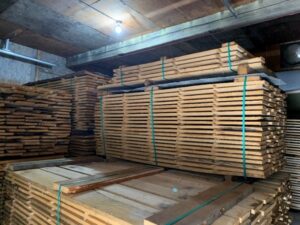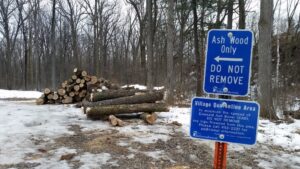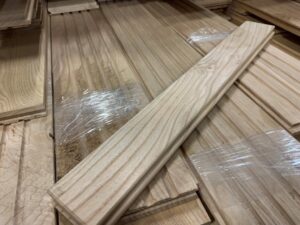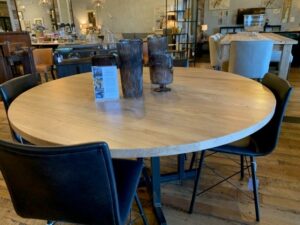Forest products markets play an important role across Wisconsin’s urban and rural economies and are strongly tied to healthy, well-managed forests. Division staff in the Forest Products Services (FPS) team support market growth by investigating new uses for Wisconsin wood, providing professional guidance on emerging products and technologies, gathering data on Wisconsin’s timber product output and being a bridge between Wisconsin producers and buyers (i.e. the marketplace).
A market segment experiencing notable growth is urban wood recycling. Historically, urban trees were used by only a few mills in the state. However, the increase of trees killed by invasive insects and disease caused many municipalities to seek alternative uses for urban wood rather than disposing material in a landfill. Recent efforts to market this growing source of material and develop ways to recycle urban trees within communities led Wisconsin to become one of the leading states in urban wood utilization. Throughout the state, markets continue to grow; at least 30 companies are producing products made from urban wood.
FPS staff support urban wood utilization in Wisconsin by working closely with the DNR Urban Forestry Program to connect municipalities with these local businesses while also identifying strategies for capturing traditional outlets. In addition, the FPS team also helps communities and arborists understand specifications and other requirements that make it more likely that trees are utilized for their highest and best use. Whether sorting logs by size or product type, or laying out yard access for delivery trucks, these steps can go a long way for mills and artisans to use urban logs and material.
A recent example involved the City of Green Bay and surrounding communities that sought to find a better use for ash trees succumbing to Emerald Ash Borer (EAB). FPS staff identified a solution by connecting them with a local wood manufacturer, Urban Evolutions, who repurposed the wood into fine furniture and flooring. At least one of the communities also sold pulpwood to a nearby mill for specialty papers. Urban Evolutions, located in Appleton, WI, is a custom furniture and fixture manufacturer specializing in reclaimed materials, including urban wood. The company is a member of Wisconsin Urban Wood, a non-profit network of arborists, municipalities, sawyers, retailers and advocates that recycle urban trees back to the community.
“The Wisconsin DNR has been instrumental in developing urban wood as a resource for our products and materials such as flooring, wall and ceiling paneling and tabletop surfaces. Scott Lyon and the Forest Products Services team have connected us with municipalities across the state looking to repurpose their ash trees plagued by the emerald ash borer. We have received valuable instruction on drying and handling timber in log form. As a result, felled city trees from Wisconsin have made their way into homes, and corporate office interiors across the country.” – Robin Janson, President, Urban Evolutions (Appleton, WI)

A glimpse into the dry kiln where Urban ash lumber is being dried to achieve a desired moisture content before being made into furniture and other interior furnishings. Credit: Wisconsin DNR

The area designated by a municipality to quarantine Ash logs to prevent the spread of EAB. In addition, it serves as a location for workers to sort and stage ash logs for marketing to wood manufacturers. Credit: Wisconsin DNR

Wisconsin urban ash flooring manufactured and sold by Urban Evolutions in Appleton, WI. Credit: Wisconsin DNR

An urban ash table at the Urban Evolutions showroom that was repurposed from a northeastern Wisconsin city’s trees that were removed due to Emerald Ash Borer (EAB). Credit: Wisconsin DNR
